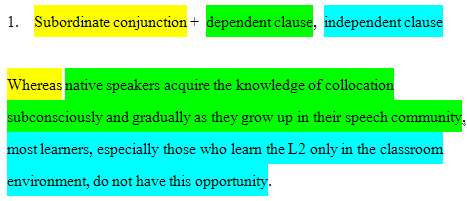หลักการเขียนภาษาอังกฤษ:
การใช้คำ การเขียนประโยค ย่อหน้า และข้อความต่อเนื่อง
Sentence Writing (การเขียนประโยค)
| |
4.3 Complex sentence |
| |
Complex sentence ประกอบด้วย main clause (independent clause) และ subordinate clause (dependent clause) โดย subordinate clause แบ่งเป็น 3 ประเภทคือ adjective clause (relative clause), noun clause, และ adverb clause
adjective clause (relative clause) เป็น subordinate clause เชื่อมกับ main clause ด้วย relative pronoun และ relative adverb ใช้ ขยายคำนามโดยอาจชี้เฉพาะคำนามนั้นหรือให้ข้อมูลเพิ่มเติม |
| |
ตัวอย่าง |
Those who learn the L2 only in the classroom environment do not have this opportunity.
|
| |
noun clause เป็น subordinate clause ทำหน้าที่เหมือนคำนามเชื่อมกับ main clause โดยใช้คำเชื่อมเช่น that, whether/if และ wh-question |
| |
ตัวอย่าง |
The researcher believes that learning is a slow and gradual process. |
| |
adverb clause เป็น subordinate clause ทำหน้าที่เหมือนคำนามเชื่อมกับ main clause โดยใช้คำเชื่อม บอก manner, place, time, reason, purpose, result, concession/contrast, comparison |
| |
ตัวอย่าง |
|
| |

|
| |
 |
| |

|
| |
 |
| |
complex sentence ต่างจาก compound sentence คือ ผู้เขียนเลือกเน้นใจความหลัก main clause หรือ independent clause) ใจความรอง (subordinate clause หรือ dependent clause)ได้
|
| |
|
Back <<-----
Next ----->>